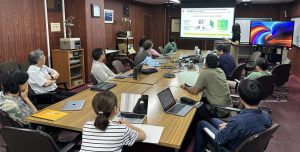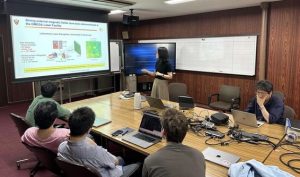来日・開催報告:拠点メンバー来日&セミナー開催(Prof. Lan Gao, Princeton University)
プリンストン大学から拠点メンバーのProf. Lan Gaoが共同研究のためにレーザー研に来訪しました。合わせてセミナーをして頂きました
–Speaker—
Gao Lan
Princeton Plasma Physics Laboratory, Princeton University
–Title–
Particle Acceleration and Ion Acoustic Waves during Magnetically Driven Reconnection using Laser-Powered Capacitor Coils
–Abstract–
Magnetic reconnection is a ubiquitous phenomenon in astrophysical plasmas that rapidly converts magnetic energy into some combination of plasma flow energy, thermal energy, and non-thermal energetic particles in the presence of a magnetic topology change. Over the past decade, our team has been dedicated to developing a robust new experimental platform to study magnetically driven reconnection using strong coil currents powered by high power lasers [1]. KJ-class lasers were used to drive parallel currents to reconnect MG-level magnetic fields in a quasi-axisymmetric geometry. In this presentation, I will report an overview of our unique platform and most recent results on direct measurement of particle acceleration [2] and observation of ion acoustic waves [3] during magnetic reconnection. For the first time, we have successfully measured the energetic electrons generated by magnetic reconnection using particle spectrometers in our unique experiments. The angular dependence of the measured electron energy spectrum and the resulting accelerated energies, supported by particle-in-cell simulations, indicate that the mechanism of direct electric field acceleration by the out-of-plane reconnection electric field is at work [2]. Furthermore, we observe a sudden onset of ion acoustic bursts measured by collective Thomson scattering in the exhaust of magnetic reconnection, which are followed by electron acoustic bursts with electron heating and bulk acceleration [3]. Our results therefore validate one of the proposed particle acceleration mechanisms by magnetic reconnection and demonstrate the importance of ion and electron acoustic dynamics during reconnection when ion Landau damping is ineffective, a condition applicable to a range of astrophysical plasmas.
Publications:
[1] L. Gao et al., Physics of Plasma 23, 043106 (2016) [2] A. Chien et al., Nature Physics 19 (2023) [3] S. Zhang et al., Nature Physics 20 (2023)



